-
THE FABLE (Ken Eguchi 2019)
KEN EGUCHI: THE FABLE (2019)
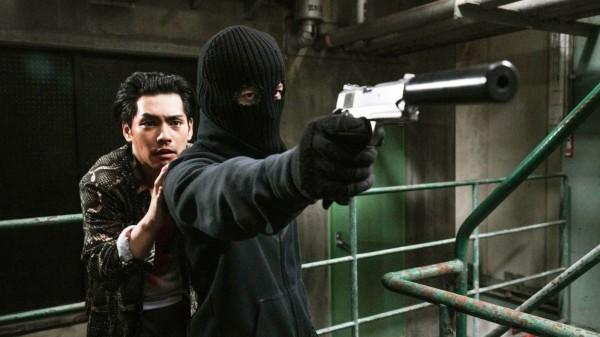
YUYA YAGIRA AND JUN'ICHI OKADA IN THE FABLE
Being "normal" is too difficult for a yakuza hit man
This wildly absurd, over-the-top gangster film (but aren't they all?) has just that extra edge of absurdity that is explained by one thing: it's from manga. The central figure, "the Fable," pronounced "za faburu", a legendary yakuza hit man whose existence some think is purely mythical till they find out otherwise, is Sato (Jun'ichi Okada), an ace, invincible professional killer put on leave by his boss (Kôichi Satô). His orders are to act "normal" for one year, because his boss thinks "top assassins need that skill." Sato goes underground in Osaka (at first exaggeratedly imitating the rural Osaka accent) with his hotshot female sidekick. He starts dressing in casual, nondescript clothes. He is commanded to get a "normal" job. It's hard for him to find work because he refuses to pretend he likes any activity he might be hired to do. Finally Sato meets Misaki (Mizuki Yamamoto), a charming woman, who helps him work at a publisher as a handyman. There, he develops a new talent, raising his pay from 800 yen an hour to 900 (laughably little either way for a hit man), by doing childlike doodle-drawings that seem so charming to the boss because they "make people happy." These drawings indulge a kind of cuteness peculiar to the Japanese taste.
This film notably also notably contains Yűya Yagira, who won the Best Actor award at Cannes in 2004 at the uniquely young age of 14 for his first movie role n Hirakasu Koreeda's extraordinary Nobody Knows (誰も知らない Dare mo Shiranai). Here Yaqira takes the role of Kojima, a wild, absurdly egotistical and histrionic young gangster type just released from eight years in prison. The boss has trouble keeping Kojima in check, being, through much of the film, in the hospital for a stroke. (He has to have someone else keep an eye on Sato.) The boss has ordered Kojima to do nothing till he is up and about to watch over him. But that doesn't quite work. This story is about the need for control. Yagira's wild histrionics, his facial expressions and drawn out, comically menacing or chortling speech, help make this clear manga material and more a caricature of a gangster movie than a serious one.
Misaki has posed for "art" photos. When Kojima finds this out and starts trying to force her to pose for porn, she is in danger, and when Sato finds out about this, he cannot allow it. He is going to have to find a way of getting around his overlord's restrictions on his behavior. This finally leads to a prolonged sequence of violent martial arts action involving hand-to-hand combat and shooting. The movie is quite restrained till then, late in the game, it explodes into wild but carefully choreographed chaos on a network of railings and metal and concrete stairways. The sound of the bullets clatters deliciously and so does the click of feet on metal. All this is reportedly staged "by Jackie Clan's crew." The festival blurb concludes, "The Fable is a vibrant pastiche of kinetic storytelling, wry humor, nail-biting suspense, and hyperbolic action." It's kinda true, but you might enjoy this a lot more if you keep reminding yourself, "Forget it Jake, it's manga."
The original manga is by Katsuhisa Minami,the screenplay by Watanabe Yutsuke.
In his "normal" life Sato keeps a parakeet in his room, his only decoration, which reminded me of Alain Delon's canary in Jean-Pierre Melville's classic Le Samouraď . But if Eguchi could achieve the iconic austerity of Melville, he'd have made quite another movie. I didn't even get to the legendary origin story of this chock-full film.
The Fable ザ・ファブル (kitagana transliteration for "Fable"), 125 mins., has four festival releases listed in June and July 2019, starting with Shanghai June 15, and including the NYAFF, where it was screened for this review.
NYFF showtime
Tuesday, July 2
6:00 PM
Walter Reade Theater
Last edited by Chris Knipp; 08-22-2021 at 09:43 AM.
-
IF YOU ARE HAPPY (Chen Xiaoming 2019)
CHEN XIAOMING: IF YOU ARE HAPPY 学区房72小时 (2019)
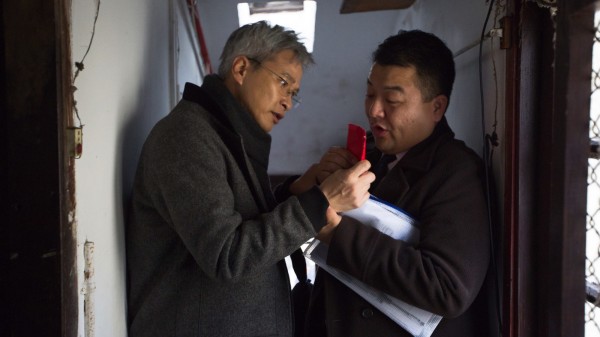
Bourgeois stress, Shanghai style
This film's ironic (English only) title comes from a relentlessly jaunty American kiddie song ("If you're happy and you know it, clap you hands"). That's what plays in Professor Fu's car, to feed his little girl English. She is in kindergarten but, welcome to the life of contemporary Shanghai yuppies: all focus is on preparing her for getting into the best schools. For getting ahead. And at the moment in this virtually real-time film progressing over less than a week, Prof. Fu's whole focus is on buying an apartment in the Huanuang distrct, where there's a good school for the child.
In the opening scene Fu looks at a classically shitty flat many flights up with dangling electrical wiring and a "view" of the school you have to climb up on a chair to see. He engages in virtual hand-to-hand combat with the crude realtor over whether he can have a chance at this dump, for which he must pay the equivalent of over $500K USD with a hefty cash down payment, more than he has, due almost immediately, or another buyer will snap it up.
In the course of the film Professor Fu shakily puts this project together, risking anything, including job, marriage, reputation, to do so. And then it all sort of falls apart again. Director Chen Xiaoming builds the action with tense, semi-vérité precipitousness that creates real tension for a while, but weakens his story with an indecisive finale partly suggesting regulations in China have now changed and all this might not make sense anymore.
In this venial depiction of contemporary China, everybody's after something so they can get ahead, and nobody cares much how they get it. Professor Fu's college students, with inadequate averages, are out to bribe him to change their grades. His and his wife's housekeeper "Auntie Niu" wants to get the Fus' nice apartment that he's willing to give up for a low price to get rapid cash, so her son can secure a residence in Shanghai that will enable him to marry. Fu didn't plan on that but accepts it as cash in hand. Later when the realtor tells Fu the price of the other apartment has gone up, he's quite willing to double-cross "Aunt."
Central to this high-class soap opera with a facade of social commentary is Professor Fu, present in every scene. He is a tall, stylish man with handsome salt-and-pepper hair and a little scarf knotted French-style. We see him making out with one of his girl students, a rich one, in his car. We see him wrestling with the "Aunt", with the realtor, with a lawyer, and with his weak, depressed wife. Rarely do we see him in in a classroom, but we see him repeatedly talking to a university official who warns him there are accusations of faculty bribe-taking which eventually turn out to be against him.
If You Are Happy may be vivid contemporary social commentary for Chinese viewers. A Chinese article says of the film that its "plot has accurately hit the anxiety of many Chinese parents today." But it fails to rise to the level of cinema achieved by a similar litigious drama that comes to mind, Asghar Farhadi's A Separation (NYFF 2011). Farhadi's film too has a telenovela quality, at first, anyway. But it is far more complex. In its rushed, precipitous action and limited time-scheme, If You Are Happy limits itself - to the narrow scope of its limited people. Nonetheless, as a slice of contemporary urban Chinese life, it provides a telling picture.
Chen Xiaoming worked as miscellaneous crew on Wong Kar-wai's Grandmaster in 2013. The cast features Guan Xuan, Xu Xing and Fu Wei.
If You Are Happy 学区房72小时 (School District 72 hours), 99 mins., was released in China June 28, 2019. It was screened for this review as part of the NYAFF.
NYAFF schowtime:
Wednesday, July 3
7:30 PM
Last edited by Chris Knipp; 06-27-2019 at 08:33 AM.
-
DARE TO STOP US 止められるか、俺たちを, (Kazuya Shiraishi 2018)
KAZUYA SHIRAISHI: DARE TO STOP US 止められるか、俺たちを(2018)
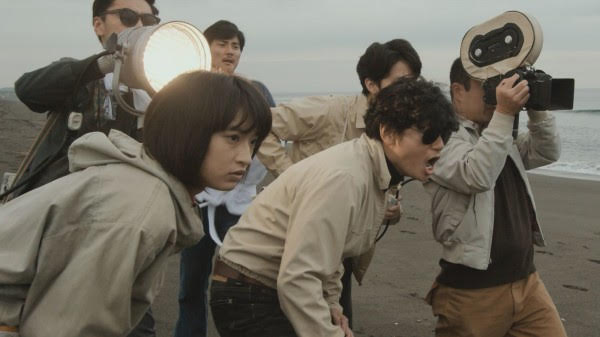
WAKAMATSU'S CREW AT WORK IN DARE TO STOP US; MEGUMI (MUGI KADAWAKI), LEFT
A radical Japanese movie company
Kōji Wakamatsu was a provocative Japanese film director who defies classification. He had been in the yakuza, and even as a filmmaker, gave free rein to an aggressive, provocative personality. His cinematic production ranged from softcore porn pinku eiga films like Ecstasy of the Angels and Go, Go, Second Time Virgin to films about revolution and the radical Palestinian PFLP. He also produced Nagisa Ōshima's famous shocker of radical sexuality In the Realm of the Senses. The porn ones themselves incorporated radical politics and radical aesthetics with the exploitation. This film about Wakamatsu, some of his key associates, and a young woman, struggles to convey this mixture which, for an American, may be hard to imagine, though there is a funky charm about the group dynamic.
The Sixties and Seventies were the most fertile period of Wakamatsu Productions, founded by revolutionary auteur Koji Wakamatsu (Caterpillar) and staffed (for free) with radical young artists like avant-garde filmmaker Masao Adachi, cinematographer Hideo Ito, and scriptwriter Arai (Kisetsu Fujiwara). Kazuya Shiraishi (The Blood of Wolves) himself got started making exploitation pictures at the company, now presents this raucous but fact-based account of one young dreamer Megumi (Mugi Kadowaki), who joins Wakamatsu in the spring of 1969 to make pinku eiga. She is somewhat at a loss, but sticks with whatever happens, except that she can't join in the company's radical political action. As she struggles to fit into the testosterone-heavy "family" and find her own voice, Megumi’s life becomes equal parts masculine and feminine, and over time, heroic and tragic. After she becomes pregnant by the company's still photographer Takama (Ku Ijima), Megumi's psychological instability and painful family background come forward.
One early Wakamatsu pinku eiga was Taiji ga mitsuryo suru toki ("The Embryo Hunts in Secret," 1966), in which a woman is sexually enslaved by her boss, and the 1969 Yuke yuke nidome no shojo ("Go, Go Second Time Virgin"), featured in this film. Wakamatsu co-directed, with Masao Adachi, a 1971 documentary about the People's Front for the Liberation of Palestine. His later films included the docudrama Jitsuroku Rengo Sekigun: Asama sanso e no michi (2007; United Red Army), which was screened at the Berlin International Film Festival and the Tokyo International Film Festival; Kyatapira ("Caterpillar," 2010), nominated for a Golden Bear at Berlin; and 11.25 jiketsu no hi : Mishima Yukio to wakamono-tachi (2012; 11.25: The Day He Chose His Own Fate), a biography of novelist Yukio Mishima shown at Cannes (referred to in this film), and Sennen no yuraku ("Millennial Rapture"), premiered at the Venice in 2012. Wakamatsu was named Asian Filmmaker of the Year at Busan in 2012.
At the time of his death in a traffic accident at 76 Wakamatsu was returning from a meeting for his latest project, focused on Japan's nuclear industry lobby and the Tokyo-based TEPCO company. The topical subject matter followed on the heels of the Fukushima nuclear disaster.
There's a discussion of Shraishi's film by Mark Shilling in The Japan Times (October 2018). Shilling met Wakamatsu several times and says "He was feisty and outspoken, but his sense of mission also struck me. He saw himself as a truth-telling guerrilla in a business, society and world dedicated to peddling convenient lies."
Dare to Stop Us is a movie about a group, and about intense working friendships, bull sessions, getting drunk together, and a lot of cigarette smoking. It's about personalities hanging out. They're presented jokily at first, but as the enterprise gains credibility, are seen in a more serious light. There's an old-shoe quality about many of the scenes that is very appealing. The main characters, even the brusque Wakamatsu himself (Arata Iura), come forward and become attractive, not only Arai (Kisetsu Fujiwara) and Megumi (Mugi Kadawaki) but the soulful Takima (Ku Ijima), who winds up as Megumi's bed partner, and various others. Nonetheless something may be lost in the subtitles in this largely understated and unclassifiale film. Shiraishi is trying to catch lightening in a bottle. How well he captures it may elude the non-native viewer.
Dare to Stop Us 止められるか、俺たちを, 119 mins., debuted in Japan Oct. 13, 2018 after an Oct. 5 premiere at Busan. It has been in at least five other film festivals including the NYAFF, where it was screened for this review.
NYAFF showtime:
Showtimes
Thursday, July 4
3:00 PM
Last edited by Chris Knipp; 06-29-2019 at 04:52 PM.
-
WALK WITH ME 雙魂 (Ryon Lee 2019)
RYON LEE: WALK WITH ME 雙魂 (2019)
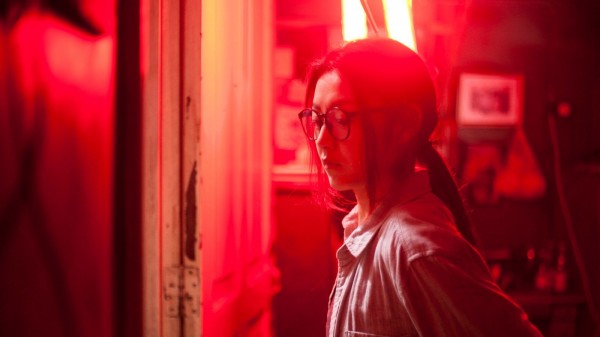
MICHELLE WAI IN WALK WITH ME
The horror of domestic life and a shitty job
The "legendary" and much-awarded Malaysian screenwriter Ryon Lee comes up with his seventh combined directorial and writing effort and his fourth horror film, his last credit having been Haunted Road 2. He pulls out all the stops here, though that doesn't mean special effects, of which there are hardly any. The cinematography is subtly colorful, with yellows, turquoise and light greens predominating. If the sing-song Cantonese dialogue (I guess) and yammering arguments are grating, one can always shut one's ears and look at the pretty pictures.
It's not any F/X but the varieties of spookiness wrecked quietly down upon Sam (Michelle Wai, aka Wei Shiya), the young female protagonist that are numerous. Interestingly, she is repeatedly threatened with rape or sexual menace from nearby men. But she just seems to live in a scary world. She is bespectacled, shy, and cute. She works in a garment factory, where the older, more experienced women workers don't like her. The manager bullies her, as does her father (Wu Yaohan) at home. Then he disappears.
Sam has recourse to a raggedy doll that may embody he spirit of her lost little brother, and may also be a vehicle of revenge. These are people who believe in ghosts, spirits that possess and haunt. Very early on, the young woman and her mother, with a group of neighborhood women, come upon a man changing over and manipulating an older woman he is apparently freeing of possession.
Randomly (in this film's rather vague sense of space) out of nowhere a young man, York (Alex Lam, aka Linde), appears, a friend ten years before when they were kids, now chubby no more but lithe, full grown, and attractive, and he rents the spare room and becomes part of the household. It is not clear to me whether Sam's mother (Wu Yiyi), known only as "Ma," is a spook or a friend. She is "just a clinic assistant" and constantly querulous, and sometimes seems afraid, at others angry and menacing. Is the young man friend or foe? And is this uncertainty an intentional ambiguity, or tonal clumsiness? Early on we see the girls's mother and father fighting? Is this menace too, the horror of domestic unrest? Or just atmosphere? Or are they possessed by the evil sports of the unquiet dead? Up on the roof with the laundry hanging on the line, York tells Sam he doesn't care about ghosts and will protect her from them. But he says "To defeat the darkness, you must become part of the darkness," which sounds spooky.
Later, while Ma and Sam are acting hysterical over ghosts - arguing over whether the doll contains the ghost of Sam's dead little brother - York uncovers a cistern and finds her perpetually disappearing dad floating in it. Who is responsible for Sam's dad's death? Is the spirit of her dead brother Dao Dao in the doll invading Ma's mind and making her crazy? Did Sam's boss Tham Kok Wai rape her as the doll tells Ma? One sequence of growing menace or suspicion is cunningly intercut with images of York dicing vegetables for a dinner he's preparing for the vegetarians, Ma and Sam, the chop-chop and the rising music almost worthy of Hitchcock. Lee makes an admirably efficient use of available scene for his chilling effects; a sewing machine becomes a fatal torture device - and it is all done subtly, without gore. The melodrama is excessive throughout, but there is an odd restraint which, with the lovely blues and greens, makes this an interesting experience.
Walk With Me 雙魂 (Shuāng hún, "Double Soul"), 92 mins., got its North American premiere in the NYAFF, where it was screened for this review. It reportedly was exported before its domestic release. Facebook page. This has some Hong Kong actors in the leads and I believe was shot in Hong Kong.
Last edited by Chris Knipp; 07-02-2019 at 02:02 PM.
-
WINTER AFTER WINTER (Xing Jian 2019)
XING JIAN: WINTER AFTER WINTER (2019)
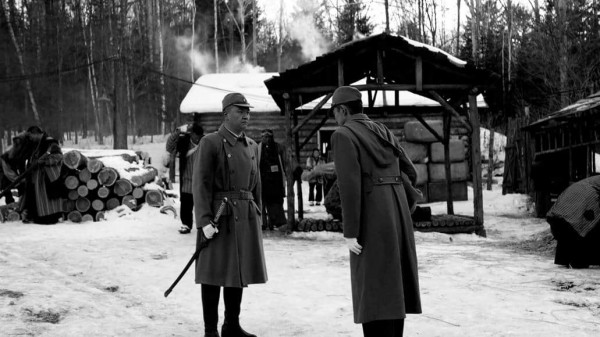
AN EXTERIOR SCENE FROM WINER AFTER WINTER
Elephants sitting still?
Xing Jiang reportedly debuted with an austere self-financed film about an old man at the top of a mountain in winter. Things have hardly become less chilly or austere here in this sophomore effort, funded somewhat inexplicably by the tech conglomerate Alibaba. It is in wide screen "high-contrast monochrome" (I'll be relying as here on Clarence Tsui's Hollywood Reporter review), so the look itself is elegantly chilly. It focuses on a Chinese family in Manchuria headed by Lao Si (Gao Qiang).
It's the end of the War, 1944, and the Japanese are desperately trying to avoid the fact that their empire is crumbling, and are about to take Lao Si's three son's away to hard labor camps. The local Japanese commander (Hibino Akira) is at Lao Si's house to claim the sons. The old man is desperate to maintain his family line. He wants his young daughter-in-law to be impregnated, and since her husband (Dong Lianghai) is impotent, he gets the marriage annulled so one of the younger sons can step in and do the job.
The second son Lao Er (Yuan Liguo) decides to flee the house to join the guerrillas instead. The timid youngest son Lao San (Liu Di) tries to do what his father wants but fails before they are taken away. Things get more complicated when later Lao San escapes labor camp and is nursed back to health by the long-suffering, mostly silent wife Kun (Yan Bingyan. In the closeness of her nursing Lao San back to health, he does get her pregnant. Then Lao Er reappears and nearly kills Kun "out of jealousy and disgust" at this event. After Kun is pregnant, Lao Si arrabged a quick cover marriage between her and the mentally handicapped son of the village elder statesman.
All of this is grim but also not without its comic side. The use of long takes, the austere style, lengthily focused on menial tasks by Kun in the grubby, dark, unheated interiors of Lao Si's farmstead, and the stoical behavior make this a prime example of slow cinema. One early scene where a man and a woman, heavily bundled up against the cold, sit and stare mutely at each other for at least five minutes, almost lost me.
Tsui points out this film is represented by Rediance and that it is the Beijing outfit that "helped bring Cai Chengjie's black-and-white supernatural satire The Widowed Witch (a.k.a.Shaman) and Hu Bo's soul-shattering An Elephant Sitting Still to international prominence last year." They may not have quite that kind of luck this time.
Also reviewed at Rotterdam by Wendy Ide for Screen Daily.
Winter After Winter('Dong Qu Dong You Lai'), 110 mins., debuted at Rotterdam, showing in at least five other international festivals. It was screened for this review as part of the NYAFF.
NYAFF showtime:
Friday, July 5
3:00 PM
Last edited by Chris Knipp; 06-29-2019 at 11:57 PM.
-
SEE YOU TOMORROW 擺渡人 (Zhang Jiajia 2016)
ZHANG JIAJIA: SEE YOU TOMORROW 擺渡人 (2016)

TONY CHIU-WAI LEUNG AND TAKESHI KANESHIRO IN SEE YOU TOMORROW
[IMDb:]
The story follows Chen Mo (Tony Chiu-Wai Leung), the bar owner and 'ferryman', as he is slowly facing his own traumatic past, whilst helping the people around him, including his co-partner Guan Chun (Takeshi Kaneshiro), the singer Ma Li (Eason Chan) and the neighbor Xiao Yu (Angelababy).
[Wikipedia:]
See You Tomorrow (Chinese: 擺渡人) is a 2016 Chinese-Hong Kong romantic comedy film directed by Chinese writer Zhang Jiajia in his directorial debut and produced and written by Wong Kar-wai with Alibaba Pictures.[5][6][7] It is based loosely on Zhang's own best-selling book Passing From Your World in the collection I Belonged to You.[8] It stars Tony Leung Chiu-wai, Takeshi Kaneshiro and Angelababy.[3] Filming started in July 2015.[9] It was released in China by Alibaba Pictures on December 23 , 2016.[10].
No full-length review will be available of this film at the moment.
Last edited by Chris Knipp; 06-29-2019 at 01:50 PM.
-
MONEY 돈 (Park Noo-ri 2019)
PARK NOO-RI: MONEY 돈 (2019)
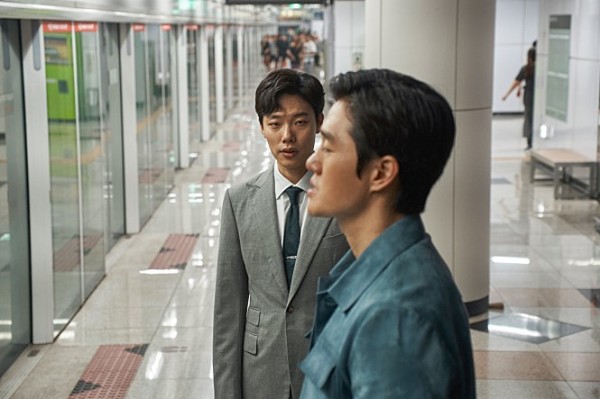
RYU JEON-YEOL AND YOO JI-TAE IN MONEY
Temptation
Money is a deliciously fresh, and a little raw, depiction of fast and shifty stock brokering and white collar high crimes and misdemeanors from Korea. Director Park Noo-ri has made a stunning feature debut, and Ryu Jeon-yeol's electric, nimble performance in the lead shows why he's a rising star.
As a new take on Oliver Stone's Wall Street from Korea, this movie ramps up the action to physical and high crime in the second half. While close to the Wall Street trajectory, its glossy big spender trappings make one think more of Scorsese's later The Wolf of. . . But everything is updated further here, and a smoothness with the latest technology. Money is already attracting interest in various quarters. There is a lengthy-ish piece on it in Cinema Escapist.
When fledgling broker Cho Il-hyun (Ryu Jun-yeol) comes to work selling stocks at Yeouido, Seoul's financial district, they call him Raspberry because his parents have a raspberry farm. He's fresh, energetic, and ready but very green. The early tipping point comes when Choi can't understand a rapidly mumbled phone order - but won't admit it - and, guessing wrong, loses a client fifty thousand dollars by buying when he was supposed to sell. This draws the attention of devious and shadowy fund manager Ticket (Yoo Ji-tae, Oldboy) who starts feeding him illicit insider deals using thumb drives that he throws in the river when the lucrative deal is done. His first such deal is a $50 million trade that nets Cho $1.4 million, instantly delivering him a whole new lifestyle and a whole new outlook. He ditches his old girlfriend for Park Si-eun (Won Jin-ah), a slick babe who's a fellow broker and introduces him to bespoke suits and other posh accoutrements. Cho steps forward from another young, handsome broker who's to the manner born, but isn't doing so much himself.
Cho is being tracked by an insidious and persistent investigator at Korea’s securities regulator - the sticky, troublesome Han Ji-chul (Jo Woo-jin), who repeatedly feeds Cho photos of himself in compromising situations, seemingf as much blackmailer as a law officer. Ticket urges Cho to act confident and says Han's creepy sub rosa snooping only shows his organization hasn't got a solid case.
As Richard Yu points out in his discussion of Money in the new global (and Asian-focused) online review Cinema Escapist, Cho hasn't the heft or even the interest as a character of the now iconic Gordon "Greed is good" Gekko memorably played by Michael Douglas. For all his energy, Cho seems barely more than a schoolboy compared to some of the brawny, driven financial manipulators in American Wall Street movies.
But we must bear in mind that Money is conceived throughout more as a slow-burn crime thriller, and, as Yu acknowledges, is still ultimately thrilling and fun to watch, without the big speeches or hefty characters but with good actors, a nifty script, and an elegant score.
At the public screening there will be a Q&A with director Park Noo-ri and lead actor Ryu Jun-yeol, and the latter will receive the Screen International Rising Star Asia Award.
Money 돈 (Don), 115 mins., released in South Korea and the US in March 2019. Also released in Taiwan, Vietnam, Singapore and Hong Kong. Screened for this review as part of the NYAFF. Billed as the New York Premiere, but according to an online review in J.B. Spins, it opened in Queens and New Jersey May 29.
NYAFF showtime:
Showtimes
July 6
6:00 PM
This will become available on streaming in the Us via Amazon Prime or Netflix in future.
Last edited by Chris Knipp; 06-30-2019 at 10:52 PM.
 Posting Permissions
Posting Permissions
- You may not post new threads
- You may not post replies
- You may not post attachments
- You may not edit your posts
-
Forum Rules





 Reply With Quote
Reply With Quote






Bookmarks